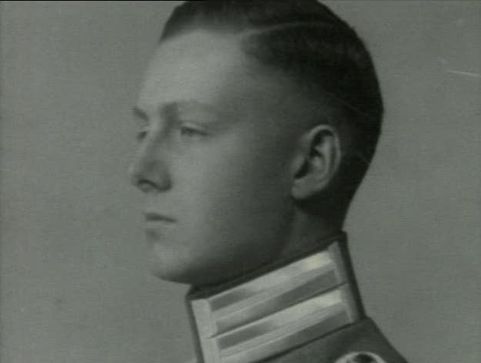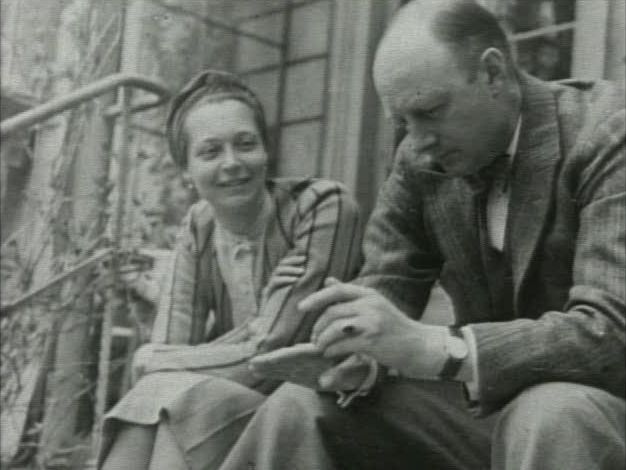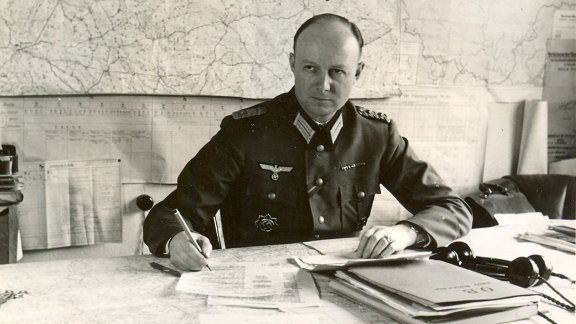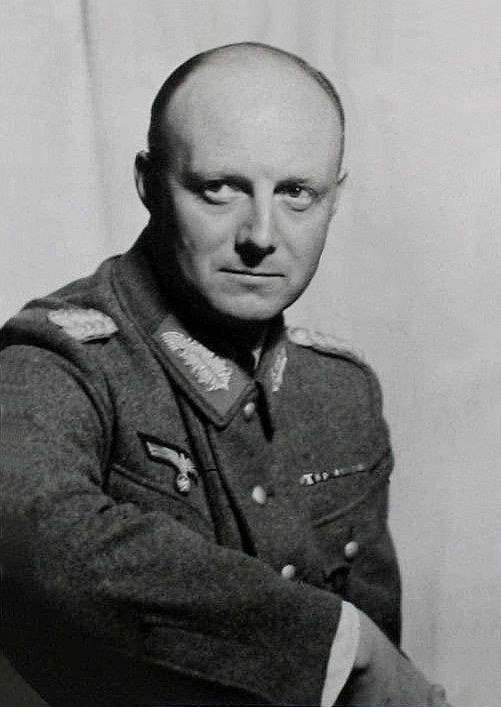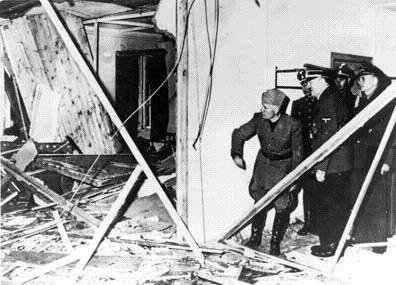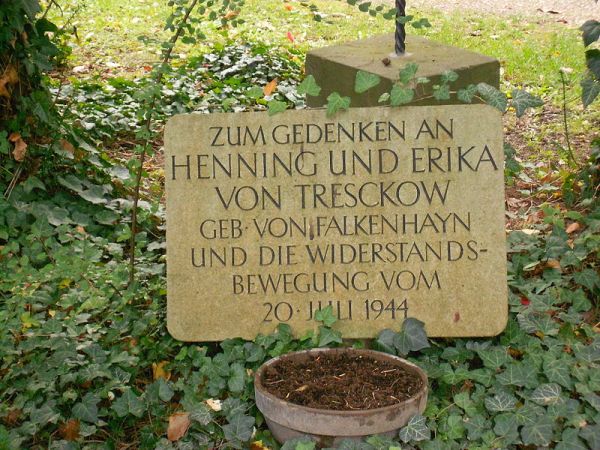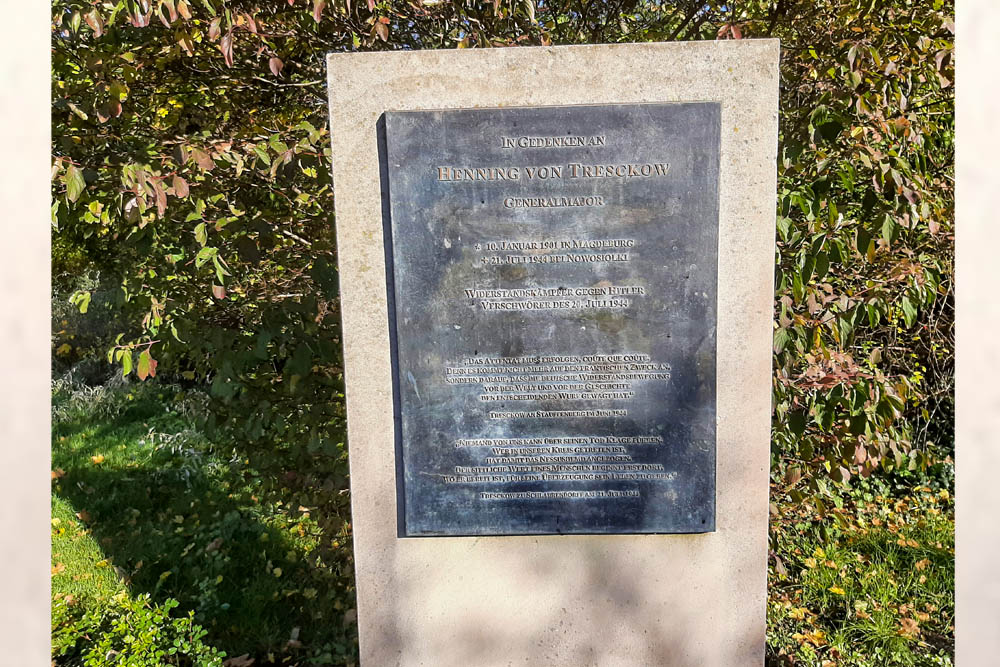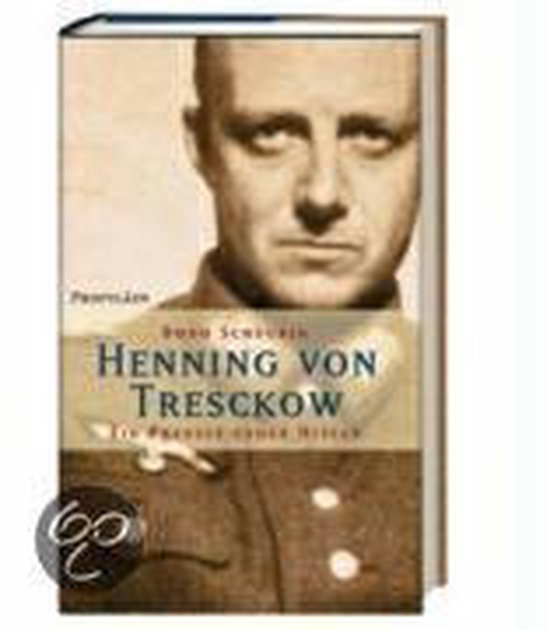First World War and interbellum
Henning Hermann Robert Karl von Tresckow was born January 10, 1901 in Magdeburg (today in Sachsen-Anhalt), a descendant of Preussian nobility. Many of his forebears had been officers in the Preußian army and Henning also wanted to join the army badly. On August 13, 1917, he was posted to 1. Garde-regiment zu Fuß in Potsdam where he started his training. After graduation, he was sent to the western front in France in the spring of 1918 and was promoted to Leutnant in August. After the First World War had come to an end, Von Tresckow joined the 9. Preußische Infanterie-Regiment where he was considered a very ambitious man with a bright future ahead of him. Nevertheless, he decided to focus on a career outside the army which he left at the end of October 1920 to enroll as a law student at the Friedrich-Wilhelm University in Berlin. A year later, Von Tresckow continued his studies in Kiel but never graduated. In 1923 he started work at the Wilhelm Kann Bank in Berlin and with his intelligence and cold-bloodedness, he managed to make a lot of money on the stock market. He possessed a very convincing personality and combined this with gallantry and the readiness to discuss anything. This left a strong impression on many people. In 1924, Von Tresckow made a world wide tour through countries in Europe and North and South America which was quite a privilege in those days. Thereafter, Von Tresckow went into business.
In January 1926, Henning von Treschkow married Erika von Falkenhayn and one month later, recommended by Reichspräsident Paul von Hindenburg, he was drafted into the Reichswehr, established after the First World War, as Leutnant in the 9. Preußische Infanterie-Regiment. He wanted this badly because he felt home in the army and his banking activities offered him too little satisfaction in life. In the years that followed in Potsdam, where the regiment was stationed, the Von Tresckow couple had four children, Mark, Rüdiger, Uta and Heidi. Although Von Tresckow did not entirely reject national socialism in these years, that attitude gradually changed after June 30, 1934 when top members of the SA and a few other prominent men were executed by order of Hitler (Bio Hitler) during the Night of the Long Knives. This violence, instigated by the state and the SS in particular, made Von Tresckow realize that national socialism was an evil system but during the 30s he was not yet ready to resist. In 1934, Henning enrolled in the Kriegsakademie in Berlin-Moabit as Hauptmann; the study that gave access to the higher ranks. Von Tresckow excelled, he scored top marks on nearly all subjects making him a candidate for top functions.
After graduating from the Kriegsakademie he was posted to the department of Operations of the General Staff at the Reichswehrministerium in September 1936 where he learned a lot about the political events of the 30s. He was severely shocked by the so-called Von Blomberg-Von Fritsch affair in which these generals who voiced criticism and were highly admired by him were sidetracked by Hitler. In addition, Von Tresckow rejected the preparations for a war as he thought the army was not yet ready for it and because of his own conviction that each nation had already been assigned its own place in the European order. He was also severely shocked by the Kristallnacht in the night of October 9 to 10 because it was the state itself that was committing the crimes. Simultaneously, as a Preussian, he was bound to his duty and continued his work: cooperating in the preparations for war. If that was to happen nonetheless, it had to be done the right way. He also knew that if he would throw in the towel, someone else would take his place who would be a dedicated supporter of the Nazi party.
Definitielijst
- First World War
- Took place from 1914 till 1918 and is also named The Great War. The conflict started because of increased nationalism, militarism and neo-colonialism in Europe. Two alliances battled one another during the 4-year war, which after a dynamic start, resulted into static trench warfare. The belligerents were the Triple Alliance (consisting of Great-Britain, France, and Russia; later enlarged by Italy and the USA, amongst others) on the one hand and the Central Powers (consisting of Germany, Austria-Hungary, Bulgaria and the Ottoman empire) on the other hand. The war was characterized by the huge number of casualties and the use of many new weapons (flamethrowers, aircraft, poison gas, tanks). The war ended in 1918 when Germany and its allies surrendered unconditionally.
- national socialism
- A political ideology drawn up by Hitler based on the superiority of the German race, the leader principle and fierce nationalism that was fed by the hard Peace of Versailles. National socialism was anti-democratic and racist. The doctrine was elaborated in Mein Kampf and organised in the NSDAP. From 1933 to 1945 National socialism was the basis of totalitarian Germany.
- Nazi
- Abbreviation of a national socialist.
- Night of the Long Knives
- Night of 30 June to 1 July 1933 during which Hitler killed many of the demanding leaders of the SA, including Ernst Röhm.
- regiment
- Part of a division. A division divided into a number of regiments. In the army traditionally the name of the major organised unit of one type of weapon.
- Reichswehr
- German army during the Weimar republic.
- socialism
- Political ideology aiming at slight or no class differences. Means of production are owned by the state. Evolved as a response to capitalism. Karl Marx tried to substantiate socialism scientific.
Images
Second World War: Poland and western Europe
In January 1939, Von Tresckow was given command of a company in the 45. Infanterie-Regiment which alienated him from the political developments. On March 1, 1939 Von Tresckow was promoted to Major and in mid August, he was transferred to the function of Erster Generalstabsoffzier (Ia) of the 228. Infanterie-Division. In that capacity he was closely involved in the preparations for the invasion of Poland, Fall Weiß and he hoped until the last that war could actually be avoided. The invasion of Poland on September 1, 1939 proceeded very well for the Germans and the Poles were forced to surrender near Kock on October 6. The consequence of the invasion of Poland though was that Great Britain and France declared war on Germany.
As it had grown quiet on the eastern front for a while, a large part of the army was transferred to the western borders of the German Reich. In mid October 1939, Von Tresckow was transferred to the headquarters of Generaloberst Gerd von Rundstedt (Bio Von Rundstedt) who was in command of Heeresgruppe A in the west. Von Tresckow was employed as the right hand man of Von Rundstedt’s chief of staff, Generalleutnant Erich von Manstein (Bio Von Manstein). This enabled him to work on Von Manstein’s plan Sichelschnitt for the invasion of France, Belgium and the Netherlands. This operation, named Fall Gelb, was launched on May 10, 1940 and at the time, Von Tresckow was working at headquarters of Heeresgruppe A where he was promoted to Oberstleutnant in mid May. Just like Poland, the west European countries suffered a crushing defeat. Von Tresckow was impressed, just like many other military. In his position, he was involved in the preparations for an possible invasion of Great Britain. Von Tresckow was sceptical about the success of such an undertaking from the beginning and the tenacious resistance by the British in 1941 only confirmed his scepticism.
At the close of 1940, Von Tresckow was appointed Erster Generalstabsoffizier (Ia) of the newly established Heeresgruppe Mitte. In that capacity he worked on a plan of attack on the Soviet Union, one of Hitler’s plans Von Tresckow was highly sceptical about. In this position, Von Tresckow entered into close cooperation with his runner Fabian von Schlabrendorff, an important sidekick in his later resistance. Von Tresckow learned much about the preparations for the invasion of the Soviet Union and about the frequent postponement of the operation.
One of the best known orders prior to the launch of Operation Barbarossa, the German invasion of the Soviet Union, was the so-called Kommissarbefehl of June 6, 1941; a criminal order according to which each and every political Kommissar of the Red Army was to be executed without any form of trial. Henning von Tresckow openly voiced his horror about this violation of human rights, as is now evident from the notes of Major Engel, one of Hitler’s adjutants. According to Rudolph Christoff von Gersdorff, at the time on Von Tresckow’s staff, this Kommissarbefehl was immediately distributed orally after it had been issued among all chiefs of staff, making its implementation difficult to sabotage. Around this time, Von Tresckow was busily investigating who would be willing to resist after his resentment against the regime had gradually increased further. In this phase of the war, his investigation was limited to discussions with many military men to find out what they thought about the regime.
Definitielijst
- Heeresgruppe
- The largest German ground formation and was directly subordinate to the OKH. Mainly consisting of a number of “Armeen” with few directly subordinate other units. A Heeresgruppe operated in a large area and could number several 100,000 men.
- invasion
- Armed incursion.
- mid
- Military intelligence service.
- Red Army
- Army of the Soviet Union.
- Regiment
- Part of a division. A division divided into a number of regiments. In the army traditionally the name of the major organised unit of one type of weapon.
- resistance
- Resistance against the enemy. Often also with armed resources.
- Soviet Union
- Soviet Russia, alternative name for the USSR.
Images
Unternehmen Barbarossa and resistance
Unternehmen Barbarossa was launched on June 22, 1941 and so-called Einsatzgruppen.htm" target=_blank">Einstazgruppen were being deployed behind the front line. These units were tasked with exterminating all groups of people, e.g. Communists, partisans, the disabled, Jews and Gypsies, all considered unwanted by Hitler and his henchmen. On Tresckow’s staff, Von Gersdorff was to maintain communication with Einsatzgruppe B, commanded by SS-Gruppenführer Arthur Nebe (Bio Nebe). That way Von Tresckow and his staff were well informed about the atrocities being committed behind the front. In the village of Borissow, so Von Tresckow’s staff learned, some 8,000 Jews had been brutally murdered. In addition, his staff found out that in the rear areas of neighboring Heeresgruppen, huge numbers of people, considered unwanted by the regime had also been murdered. Those messages killed Von Tresckow’s last glimmer of hope and subsequently he was determined to organize armed resistance against Hitler with the aim of killing him.
Meanwhile Von Tresckow had started to try and persuade Generalfeldmarschall Fedor von Bock (Bio Von Bock), commander of Heeresgruppe Mitte but he did not wish to join the resistance. Efforts to persuade Generalfeldmarschall Erich von Manstein (Bio Von Manstein) and Generalfeldmarschall Günther von Kluge (Bio Von Kluge) also failed because they clung to their Preussian military pride. Von Tresckow was deeply disappointed in the highest military leadership because of their deep rooted stubbornness which prevented them from taking political developments seriously. He was of the opinion that this assault had to take place anyway without the support of these military leaders.
In the mean time, the war exacted much of Von Tresckow but that did not prevent him from relentlessly looking for support for the resistance. In 1942, he had assembled a rather steady circle of men who were ready to take action. The most important members of this group were, in addition to Von Tresckow, Fabian von Schlabrendorff (Von Tresckow’s orderly) and Rudolph Christoff Freiherr von Gersdorff (staff officer rear areas). Led by Von Tresckow, they planned a few assaults in 1943, hoping to kill Hitler by means of a bomb.
The first attempt was made when Hitler paid a visit to the Eastern Front near Smolensk on March 13, 1943. Henning von Tresckow wanted to seize the opportunity to place a bomb aboard the aircraft, killing Hitler and his entourage in flight. The resistance group of Heeresgruppe Mitte had selected a British mine as the most favorable explosive and packed four of them in a case allegedly containing two bottles of Cointreau. The case was loaded onto the aircraft disguised as a present for Oberst Hellmuth Stieff who served at Wehrmacht headquarters. A detonator with a 30 minutes time fuse had been added which had never failed before but this time, the detonator did fail because of the cold at high altitude. The bomb did not explode and Schlabrendorff had to rush to Berlin to defuse the bomb, otherwise the group around Von Tresckow would have been exposed.
Following the failed attempt of March 13, Von Tresckow wished to make another attempt at killing Hitler as soon as possible. This one took place on March 21, just one week after the first. Now Von Gersdorff wanted to blow himself and Hitler up while the Führer was inspecting captured weapons in an armament depot. The fuse was set again but the attempt failed once more as Hitler left the depot much earlier than expected. Von Gersdorff could defuse the bomb on his body in the nick of time so he and the others would not be exposed. Von Tresckow was very sad about both failed attempts because the earlier Hitler could be stopped, the better. He did not allow himself to be distracted and carried on relentlessly, looking for new possibilities.
In the fall of 1943, Henning was able to enjoy a short vacation as he would be given a new function as regimental commander. He used the time to contact others willing to make a coup, like Ludwig Beck, Claus Schenk Graf von Stauffenberg (Bio Von Stauffenberg) and Carl Friedrich Goerdeler. In Von Stauffenberg, Von Tresckow found his equal as to the drive with which they would make the coup. Satisfied that the outline of the attempt was completed and the preparations continued, the fresh regimental commander started his work on the Eastern Front. He was in command of the 442. Grenadier Regiment which had suffered severe setbacks at the front following the battles of Kursk and Charkow. Despite the difficult task of stabilizing the front, Von Tresckow enjoyed the freedom he had in this function. That way he had two faces as he was preparing a coup and simultaneously waging a war on the Eastern Front.
Early December 1943, he was transferred again, this time as Chef des Generalstabes of 2. Armee. The situation of that army on the Eastern Front was dismal as the army had been routed by the Red Army. Owing to the orders by Hitler, the Wehrmacht had to hold on to a front line far too long so the troops were widely spaced. This made it easier for the Soviets to recapture territory. The fact that Hitler refused to change the situation at the front was all the more reason for Von Tresckow to eliminate him. He was extremely vexed by the passive attitude of most generals who considered following orders their only task. Von Tresckow did not shy away from his own possible death as he considered it an acceptable risk of an attempt on Hitler. Actually he wanted most to tell all generals straight to their faces they were jointly responsible for an awful war at the Eastern Front. The lack of support from senior officers in 1942 was an important reason for Tresckow to postpone a coup. He was afraid they would turn against the plotters and that was dangerous in a society where Preussian hierarchy and tradition had left deep marks. With the vast Red Army on the doorstep, Von Tresckow would surely not let something like that happen.
Definitielijst
- Führer
- German word for leader. During his reign of power Adolf Hitler was Führer of Nazi Germany.
- Heeresgruppe
- The largest German ground formation and was directly subordinate to the OKH. Mainly consisting of a number of “Armeen” with few directly subordinate other units. A Heeresgruppe operated in a large area and could number several 100,000 men.
- Jews
- Middle Eastern people with own religion that lived in Palestine. They distinguished themselves by their strong monotheism and the strict observance of the Law and tradition. During World War 2 the Jewish people were ruthlessly persecuted and annihilated by the German Nazis. . An estimated 6,000,000 Jews were exterminated.
- mine
- An object filled with explosives, equipped with detonator which is activated by either remote control or by colliding with the targeted object. Mines are intended to destroy of damage vehicles, aircrafts or vessels, or to injure, kill or otherwise putting staff out of action. It is also possible to deny enemy access of a specific area by laying mines.
- Red Army
- Army of the Soviet Union.
- Regiment
- Part of a division. A division divided into a number of regiments. In the army traditionally the name of the major organised unit of one type of weapon.
- resistance
- Resistance against the enemy. Often also with armed resources.
- Wehrmacht
- German armed military forces, divided in ground forces, air force and navy.
Images
Conspiracy of July 20, 1944
In April 1944, Von Tresckow learned that the plans for a new attempt were ready and that the code word Walküre, the start of the operation to mobilize the Ersatzheer, could be given out at any moment. This Ersatzheer was to occupy all important state institutions and subsequently the resistance group would unfold its plan to take over the state. It must be mentioned here that Von Tresckow was hardly involved in the organization during these last months as he had to remain at the front. On June 1, 1944, Von Tresckow was promoted to Generalmajor, making him one of the youngest generals of the Wehrmacht.
Although he opposed Hitler’s plans for war he did not wish, once it was launched, to crush German pride and also wanted to guide the German soldier through the war as smoothly as possible. Von Tresckow continuously pointed to gaps in the front and managed to close them with improvised methods. Another way was hardly possible regarding the hopeless situation for the Germans at the Eastern Front. Facing 2. Armee stood the Red Army with six times the number of troops the Wehrmacht could put afield. In addition, there were dangerous salients in the front line and on orders from Hitler, those were not to be abandoned and as a result, encirclements could have been avoided easily. That is exactly what happened early July 1944: the Soviets surrounded 3. Panzerarmee and 4. and 9. Armee, taking 350,000 prisoners as a result. Von Tresckow grabbed the opportunity to persuade others to join the German resistance as the situation on the Eastern Front was now even more than hopeless.
On June 6, 1944, the Allies landed on the beaches of Normandy and for the resistance, the question arose whether a coup would still make sense. One of the goals was to prevent an unconditional surrender but that became much more complicated with the Allied armies at the gates. Tresckow however was determined and he told Von Stauffenberg in Berlin: "The attempt has to be made, whatever the odds. Even if it fails, action must be taken in Berlin. At the moment, the practical goal is of less importance; it is more important to show the world and history that the German resistance movement has made the necessary effort. All else is of minor importance." A decisive factor for the moment of the attempt was that Von Stauffenberg had been appointed chief of staff of the Ersatzheer, giving him easy access to Hitler. That was another reason why the attempt could not be made earlier: it was not easy to approach Hitler. Nonetheless, action could have been taken earlier but pride prevented the military from taking action, combined with the fear massive chaos would erupt. In addition, the various military and civil members of the resistance all had different ideas about the execution of the attempt and it took much time to get all noses pointed in the same direction.
After Von Stauffenberg had been promoted to a favorable position, events accelerated and it was decided to make the attempt in July. From that moment on, Von Tresckow had little influence on the course of things. He still remained at the Eastern Front with 2. Armee and that also was the location where he learned that the attempt had actually been made (Assault 20-07-1944). After he had been notified Von Stauffenberg had detonated the bomb, he kept a close watch on the news. At midnight, July 20, 1944, Von Tresckow heard Hitler’s address on radio and he realized the attempt had failed. He drew the consequences from the failed attempt with these words: "A man’s moral merit starts with his willingness to give his life for his conviction." Subsequently, on July 21, he commandeered a car and drove to the front at Byalistok, feigning a fight against partisans but in reality he committed suicide by exploding a handgrenade against his temple.
Von Tresckow was buried without military honors on the Wartenberg estate where he and his family had lived for a long time. After it became clear he had been an important king pin in the resistance, he was dishonorably discharged from the army and stripped of all his decorations and ranks. In addition, his body was exhumed by order of the Gestapo and cremated in concentration camp Sachsenhausen; his ashes were dispersed in an unknown location.
Definitielijst
- concentration camp
- Closed camp where people are being held captive that are considered to be anti- social, enemies of the state, criminal or unwanted individuals. These groups mostly do not get a fair trial or are condemned to doing time in a camp.
- moral
- The will of the troops/civilians to keep fighting.
- Red Army
- Army of the Soviet Union.
- resistance
- Resistance against the enemy. Often also with armed resources.
- Wehrmacht
- German armed military forces, divided in ground forces, air force and navy.
Images
Information
- Article by:
- Matthias Ouwejan
- Translated by:
- Arnold Palthe
- Published on:
- 19-01-2025
- Feedback?
- Send it!
Related sights
Related books
Sources
- GERSDORF, R.C.F. VON, Soldat im Untergang, Ullstein Buchverlage, Berlijn, 1979.
- GRABNER, S. e.a., Henning von Tresckow. Ich bin der ich war, Lukas Verlag, Berlijn, 2001.
- SCHEURIG, B., Henning von Tresckow. Eine Preusse gegen Hitler, Ullstein Buchverlage, Berlijn, 2004.
- SCHLABRENDORFF, F. VON, Begegnungen in fünf Jahrzehnten, Wunderlich Verlag, Reinbek, 1979.
- SCHLABRENDORFF, F. VON, Offiziere gegen Hitler, Europa Verlag, Zürich, 1951.
- GILESSEN, G., 'Tresckow und der Entschluss zum Hochverrat, eine Nachschau zur Kontroverse über die Motive' In: Vierteljahrshefte für Zeitgeschichte 58 (2010): 365 – 387.
- HÜRTER, J., 'Auf dem Weg zur Militäropposition. Tresckow, Gersdorff, die Vernichtungskrieg und der Judenmord. Neue Dokumente über das Verhältnis der Heeresgruppe Mitte zur Einsatzgruppe B im Jahr 1941' In: Vierteljahrshefte für Zeitgeschichte 52 (2004): 527 – 562.
- RINGHAUSEN, G., 'Hans-Alexander von Voss (1907-1944). Offizier im Widerstand.' In: Vierteljahrshefte für Zeitgeschichte 52 (2004): 361 – 407.
